|
|
|
Sort Order |
|
|
|
Items / Page
|
|
|
|
|
|
|
| Srl | Item |
| 1 |
ID:
086137
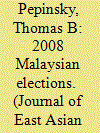

|
|
|
|
|
| Publication |
2009.
|
| Summary/Abstract |
Malaysia's twelfth general elections, held on March 8, 2008, dealt a stunning blow to the incumbent Barisan Nasional regime. For the first time since 1969, the coalition did not receive its customary two-thirds majority in the lower house of parliament. Moreover, the opposition was able to form governments in five out of eleven peninsular Malaysian states. This article uses electoral, economic, and demographic data to test a number of potential explanations for these outcomes. Evidence indicates that the regime's decreased majority is the consequence of non-Malay voters' rejecting the incumbent regime in favor of secular opposition parties.
|
|
|
|
|
|
|
|
|
|
|
|
|
|
|
|
| 2 |
ID:
179337
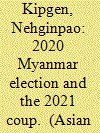

|
|
|
|
|
| Summary/Abstract |
In the 2020 general election, the National League for Democracy (NLD) won 920 of the total 1,117 seats, which was upped by 61 seats from its win in the 2015 election. The main opposition party, the Union Solidarity and Development Party (USDP), won 71 seats, down 46 from the 2015 election when it won 117 seats. The election result gave a strong mandate to the NLD for another five years. On the other hand, the USDP accused the NLD of engaging in electoral fraud including the buying of votes, and called for fresh elections in coordination with the military. Following a complaint from its proxy party, the USDP, the military initially said it would conduct an investigation in 218 townships where the military personnel and their family members cast their votes, which it expanded to 314 townships in all states and regions across the country; this finally led to the declaration of a state of emergency rule (the military coup) on 1 February 2021. Ethnic parties also alleged that the NLD government made certain pre-poll decisions that disadvantaged the ethnic minorities. This paper analyzes the electoral process and its outcome in an attempt to understand whether the election led to the deepening of democracy or the widening of division in the country's democratization process.
|
|
|
|
|
|
|
|
|
|
|
|
|
|
|
|
| 3 |
ID:
171356
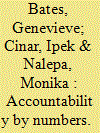

|
|
|
|
|
| Summary/Abstract |
In an era of democratic backsliding, scholars and policymakers wonder if failure to reckon with former authoritarian elites and their collaborators plays a role. Yet without adequate data on the way former autocracies and countries emerging from conflict deal with human rights violators, it is hard to tell if new democracies are unstable because of their failure to reckon with their former authoritarian elites or despite it. We introduce a dataset of personnel transitional justice events that allows scholars to answer such questions, disaggregating these events temporally from the date of a country’s democratization. The time series nature of our data allows scholars to measure key characteristics of states’ dealing with their past and complements existing transitional justice datasets by focusing not only on post-conflict societies and not only on post-authoritarian societies, but on both. To showcase the possibilities our data affords scholars, we use it to develop three novel measures of personnel transitional justice: severity, urgency, and volatility. The granular structure of our data allows researchers to construct additional measures depending on their theoretical questions of interest. We illustrate the use of severity of transitional justice in a regression that also employs data from the Varieties of Democracy project.
|
|
|
|
|
|
|
|
|
|
|
|
|
|
|
|
| 4 |
ID:
147765
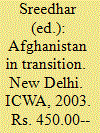

|
|
|
|
|
| Publication |
New Delhi, ICWA, 2003.
|
| Description |
231p.hbk
|
|
|
|
|
|
|
|
|
|
|
|
Copies: C:1/I:0,R:0,Q:0
Circulation
| Accession# | Call# | Current Location | Status | Policy | Location |
| 058817 | 320.9581/SRE 058817 | Main | On Shelf | General | |
|
|
|
|
| 5 |
ID:
145937
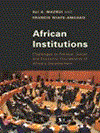

|
|
|
|
|
| Publication |
Lanham, Rowman and Littlefield, 2016.
|
| Description |
xi, 184p.pbk
|
| Standard Number |
9781442239531
|
|
|
|
|
|
|
|
|
|
|
|
Copies: C:1/I:0,R:0,Q:0
Circulation
| Accession# | Call# | Current Location | Status | Policy | Location |
| 058720 | 320.96/MAZ 058720 | Main | On Shelf | General | |
|
|
|
|
| 6 |
ID:
137841
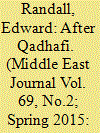

|
|
|
|
|
| Summary/Abstract |
This article examines Libya's troubled transition from Mu'ammar al-Qadhafi's authoritarian regime. The author asks what past transitions tell us about possible positive pathways from authoritarian rule and what Libya can learn from its previous failures in development in order to shed light on why Libya is struggling in its transition from regime change to economic and political development. The article concludes by identifying Libya's uniqueness with its “shallow state,” its deep regional and tribal rivalries, and distributive economy, which together are currently incapacitating progress towards sustainable development.
|
|
|
|
|
|
|
|
|
|
|
|
|
|
|
|
| 7 |
ID:
068580
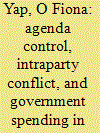

|
|
|
| 8 |
ID:
148031
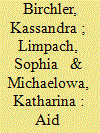

|
|
|
|
|
| Summary/Abstract |
Many argue that autocratic regimes allocate revenues from foreign aid with the aim of stabilizing their rule rather than serving economic and social development. However, donors often condition foreign aid on reforms in recipient states. We argue that when those conditions for reform focus on participative processes and government accountability, they positively affect democratization. We evaluate our claim based on different types of World Bank and IMF lending programs for a panel of 100 low- and middle-income countries over the years 1980–2011. Our results suggest that aid positively affects democratization when it strengthens domestic accountability mechanisms and thereby reduces its fungibility for recipients. The World Bank and the IMF’s poverty reduction strategy programs provide a notable case of this effect.
|
|
|
|
|
|
|
|
|
|
|
|
|
|
|
|
| 9 |
ID:
137427
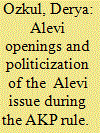

|
|
|
|
|
| Summary/Abstract |
This article reviews recent government efforts to address the “Alevi issue” and identify their successes and failures. It demonstrates that the “Alevi openings” constituted paradoxical processes: tracing various components of the “openings” through news media, it shows that, on one hand, they enabled the “Alevi issue” to be brought to public attention. On the other hand, once Alevis were made more visible in public, non-sympathizers could mobilize their representation for their own ends. These empirical findings have profound theoretical implications. They show that “discursive claims of democratization” at the state level do not necessarily result in democratic mechanisms, which can resolve the demands of a pluralistic civil society. The author argues that what she calls the “tutelary secularism” in Turkey, in other words, the management and disciplining of religious groups, continues under the Justice and Development Party (AKP) rule. This model not only fails, but also produces new sources of conflict in Turkey.
|
|
|
|
|
|
|
|
|
|
|
|
|
|
|
|
| 10 |
ID:
098222


|
|
|
| 11 |
ID:
103376
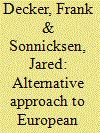

|
|
|
|
|
| Publication |
2011.
|
| Summary/Abstract |
A successful reform of any system of governance must be well informed of the system's own functional logic. In the context of its democratization, this article explores whether the institutional arrangement of the European Union has developed or behaves more like a presidential than a parliamentary system. Building on that, the authors re-examine the opportunities and feasibility of realizing that model as a step towards more democracy in European governance.
|
|
|
|
|
|
|
|
|
|
|
|
|
|
|
|
| 12 |
ID:
190026
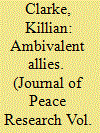

|
|
|
|
|
| Summary/Abstract |
Since the Cold War ended, foreign support has been identified as an important factor in facilitating democratization. However, in certain parts of the world Western enthusiasm for democratization has been highly uneven, particularly when regime change has been achieved through nonviolent revolutionary mobilization. This article introduces the concept of ‘ambivalent allies’ and argues that ambivalence may be highly detrimental to new democracies emerging from nonviolent resistance. Ambivalent allies signal public support for a democratic transition while remaining quietly skeptical about the desirability or viability of the new regime. These misleading signals cause democratic leaders to deprioritize the maintenance of their diverse coalitions, choosing instead an exclusivist approach that alienates their domestic partners. They therefore end up doubly exposed to counterrevolutionary threats, lacking both a broad domestic support base and strong foreign backers. The article illustrates this argument through an examination of Egypt’s 2011 revolution and 2013 coup, drawing on approximately 100 interviews with Egyptian political leaders and foreign diplomats. It shows that the USA’s ambivalence toward the transition contributed to the coup by giving the elected government headed by Mohamed Morsi a false impression that it had strong foreign backing, and that it could afford to marginalize the secularist wing of the original revolutionary coalition. Egypt’s experience is then compared to two cases in which new governments survived counterrevolutionary threats: Burkina Faso in 2014 and Madagascar in 2009. The study contributes to our understanding of how international support may facilitate or undermine democratic consolidation following nonviolent revolutions.
|
|
|
|
|
|
|
|
|
|
|
|
|
|
|
|
| 13 |
ID:
111847
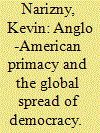

|
|
|
|
|
| Publication |
2012.
|
| Summary/Abstract |
For the past three centuries, Great Britain and the United States have stood in succession at the apex of the international hierarchy of power. They have been on the winning side of every systemic conflict in this period, from the War of the Spanish Succession to the Cold War. As a result, they have been able to influence the political and economic development of states around the world. In many of their colonies, conquests, and clients, they have propagated ideals and institutions conducive to democratization. At the same time, they have defeated numerous rivals whose success would have had ruinous consequences for democracy. The global spread of democracy, therefore, has been endogenous to the game of great power politics.
|
|
|
|
|
|
|
|
|
|
|
|
|
|
|
|
| 14 |
ID:
137631
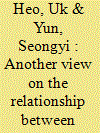

|
|
|
|
|
| Summary/Abstract |
Armed Forces and Society recently published an article, ‘‘Intra-Military Division and Democratization in South Korea’’ by Insoo Kim. In the article, Kim argues that economic development and civil society explanations for South Korea’s democratization are not sufficient because conflict in the military undermined the ability of Chun’s government to suppress the democracy movement, which made the transition possible. We refute Kim’s argument because economic development clearly made significant contribution to South Korea’s democratization by enhancing education attainment and facilitating industrialization and urbanization. Moreover, there is no clear evidence of schism in the military or among political elites, and the authoritarian leader Chun Doo-hwan agreed to change the presidential election system based on his political calculation.
|
|
|
|
|
|
|
|
|
|
|
|
|
|
|
|
| 15 |
ID:
084626
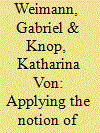

|
|
|
|
|
| Publication |
2008.
|
| Summary/Abstract |
The growing presence of modern terrorism on the Internet is at the nexus of two key trends: the democratization of communications driven by user-generated content on the Internet; and the growing awareness of modern terrorists of the potential of the Internet for their purposes. How best can the terrorists' use and abuse of the Internet be countered? As this article argues, the answer to violent radicalization on the Internet lies not in censorship of the Internet, but in a more sophisticated and complicated strategy, relying on the theoretical notion of "noise" in communication process theory.
|
|
|
|
|
|
|
|
|
|
|
|
|
|
|
|
| 16 |
ID:
125075
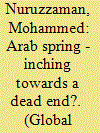

|
|
|
|
|
| Publication |
2013.
|
| Summary/Abstract |
A high degree of pessimism continues to hold a strong grip over the enthusiasts of democracy in the Arab world. In the last more than two years, the popular uprisings for social and political change have stalled in Bahrain, Syria, and Yemen. In Egypt, Libya, and Tunisia, where the populace succeeded in toppling the authoritarian rulers, the situation did not change that much. Violence, conflicts, and killings of political opponents disturbingly characterize all the Arab countries affected by the popular uprisings. In Syria, the government and opposition forces are locked in a deadly conflict with neither side being able to make a decisive breakthrough. The Egyptian army overthrew the country's first democratically elected government, headed by the Muslim Brotherhood, on 3 July 2013. On the whole, the success rate of democratization is so far disappointing. That begs the question whether the Arab popular uprisings for democratic change, what the media has conveniently dubbed the 'Arab Spring', are failing or still enduring.
|
|
|
|
|
|
|
|
|
|
|
|
|
|
|
|
| 17 |
ID:
124601
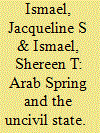

|
|
|
|
|
| Publication |
2013.
|
| Summary/Abstract |
This article examines the ongoing Arab Spring uprisings. The Arab Spring is characterized as a fundamental challenge to the postcolonial political order of the Arab world. The postcolonial Arab world has been defined by its oppressive nature and its subjugation within the international system. This autocratic and peripheral order represents the political legacy of colonial rule, where the postcolonial regimes inherited and refined the repressive techniques of the colonial regimes while, owing to international developments, reinforcing their subjugated status within the international system. The Arab Spring has, thus, represented an attempt to chart an independent path in Arab politics, marked by efforts towards democracy and civil rights. The successes and failures of the Arab Spring are critically evaluated, paying special attention to the role played by Islamist political actors. Beyond an evaluation of the domestic factors behind the various protests, the regional significance of the uprisings is evaluated, providing discussion of counterrevolutionary forces and political-sectarian developments.
|
|
|
|
|
|
|
|
|
|
|
|
|
|
|
|
| 18 |
ID:
104326
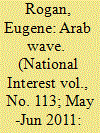

|
|
|
|
|
| Publication |
2011.
|
| Summary/Abstract |
FOR DECADES, the Arab world has lived under a variety of governments whose only point in common was the degree of autocracy they imposed on their citizens. Some blamed Arab culture, others said that Islam was incompatible with popular rule, but most agreed that the Arabs were bucking a global trend of democratization.
|
|
|
|
|
|
|
|
|
|
|
|
|
|
|
|
| 19 |
ID:
111597
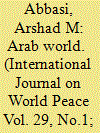

|
|
|
| 20 |
ID:
147308
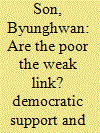

|
|
|
|
|
| Summary/Abstract |
Extant literature on democratization documents that ordinary citizens’ unconditional support for democracy is indispensable to democratic consolidation. Yet observers of nascent democracies have repeatedly witnessed that such support often hinges upon their economic conditions. This article argues that income levels have a conditioning effect on this relationship; the Korean poor see democracy as a tool for income redistribution and are less likely than the rich to support it when economic hardships appear to close windows of opportunities for such redistribution. Using survey data from the first round of the Asian Barometer Survey on South Korea, I find strong empirical support for this argument. The implication of this finding for broader literature on democratization is that the weakening of young democracies can be attributed to the poor in times of trouble, or the “weak link.”
|
|
|
|
|
|
|
|
|
|
|
|
|
|
|
|
|
|
|
|
|